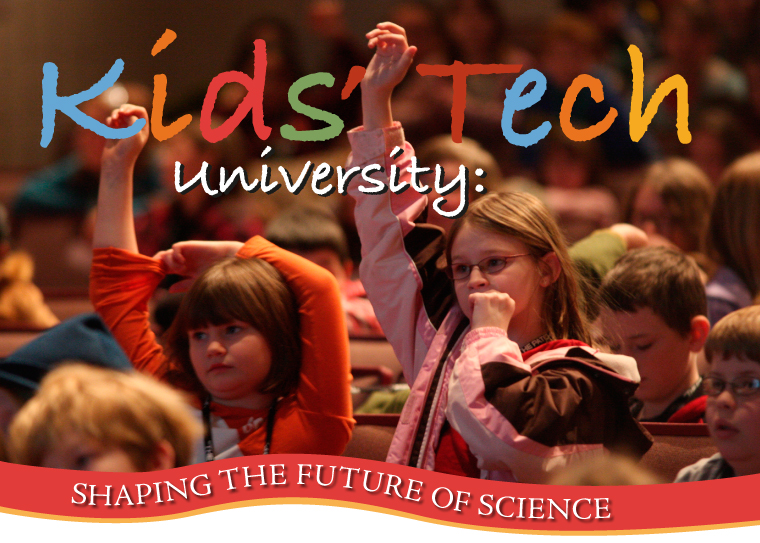|
|
Many experts agree that children need to be introduced early to the excitement of science, technology, engineering, and math if the United States is to remain competitive in the global scientific community. A new program at Virginia Tech takes that need to heart, engaging children with science by showing them how exciting and fun it can really be. Kids' Tech University (KTU) offers youths between the ages of 9 and 12 inspiring lectures, stimulating hands-on activities, and complementary online educational experiences.
EUROPEAN PEDIGREE
Sponsored principally by the Virginia Bioinformatics Institute (VBI) and Virginia Cooperative Extension's 4-H Youth Development Program, KTU is the first educational program of its type offered in the United States. Reinhard Laubenbacher, VBI professor and deputy director of education and outreach, discovered the original concept in a German newspaper article. Says Laubenbacher, "Hundreds of children have been attending individual lectures on science on the weekend at universities around Germany, which speaks volumes for the program and the enthusiasm of the kids. I wanted to see if we could build something similar in the United States."
After talking to the German project founders, Laubenbacher and his team put the necessary infrastructure into place, and kids enrolled for a semester of KTU. "We had a huge response from parents and children interested in the program and quickly realized that we were tapping into a significant educational need," says Laubenbacher.
KTU students attended lectures in a campus lecture hall, had lunch in campus dining facilities, and tackled hands-on activities that built on lecture concepts. A key feature of KTU is that the fun and excitement of the university experience continues through an online lab component, which includes activities that promote a continued interest in the lecture topics and a forum to promote discussion and teamwork.
Says Cathy Sutphin, 4-H associate director of youth development, "Through hands-on learning, KTU participants apply the ideas presented during lectures and explore other avenues. By connecting youth to the university, we increase the chances that they will not only choose a STEM [science, technology, engineering, and math] field but that they will also consider attending Virginia Tech."
KTU students heard scientists relate engaging stories about their research. Keith Devlin, known as "The Math Guy" on National Public Radio and co-founder and executive director of Stanford's Human-Sciences and Technologies Advanced Research Institute, kicked off proceedings in January 2009, answering the question "Why are there animals with spotted bodies and striped tails but no animal with a striped body and a spotted tail?" In subsequent months, Caitlin Kelleher (computer science '98), assistant professor of computer science and engineering at Washington University in St. Louis, explained why some computer programs can be so frustrating, and Louis Guillette, professor and director of the Howard Hughes Group Advantaged Training of Research Program at the University of Florida, described how he wrestles alligators in the Florida swamps to study the effects of environmental contaminants on wildlife. The first semester ended with an up-close look at what it would take to live on Mars, the lecture topic of Phil Christensen, Regents Professor and the Ed and Helen Korrick Professor of Geological Science at Arizona State University.
"The first semester of KTU was made possible due to contributions by many volunteers from the Virginia Tech community and beyond," says Laubenbacher. "Without their help, we would not have been able to put on an event of this scope, and their assistance going forward will be a key part of our success.
"We have been able to attract scientists to KTU who have shared their enthusiasm for science in a way that has captivated the children," Laubenbacher continues. "Our biggest challenge remains financial support. Despite an oversubscribed program and great feedback from children and parents, KTU continues to live in a no-man's land for funding since it is not tied to formal K-12 education or a formal university education. We are hoping to secure private and company donations to support our second semester lineup of KTU lectures and hands-on activities."
SCHOOL'S BACK
The second semester begins in January 2010. "This semester, KTU has a partnership with Tazewell County Public Schools and Tazewell 4-H to reach and involve economically disadvantaged students and their parents with the KTU program," says Kristy DiVittorio, VBI's co-principal investigator on the project.
An additional component of the program will encompass training teachers from around Virginia, providing them with opportunities to acquire Continuing Education Units to advance their professional career development. Kathleen Jamison, Extension specialist for 4-H Youth Development, will spearhead this initiative.
New and returning children will tackle questions like "What is the smallest thing a person can see?" and "Why can't humans walk on water and climb walls with their fingertips like spiders?" Harvey Mudd College Mathematics Professor Arthur Benjamin, who has appeared on The Today Show, CNN, and National Public Radio, will demonstrate his mixture of mathematics and magic, which he calls "mathemagics," and explain how to mentally solve complex math problems faster than a calculator. Returning KTU lecturer Louis Guillette will explain why alligators are important to the swamps and what they can tell us about the world in which we live.
"We have something special here," says Laubenbacher, "which I would like to see take root across the country. We can provide virtual resources that will make it possible for other universities to set up their own KTUs across the United States. In this way, I believe we could take a big step forward for the future of science in this country."
BARRY WHYTE is the strategic and research communications officer for the Virginia Bioinformatics Institute.
|
|



